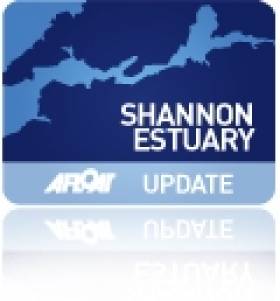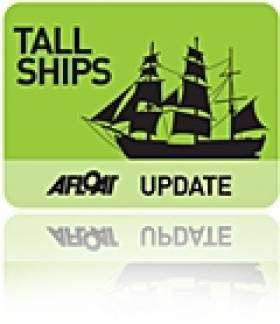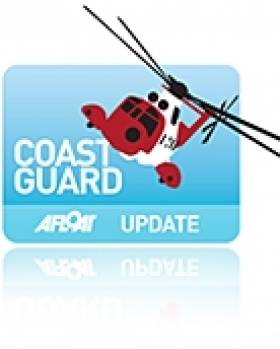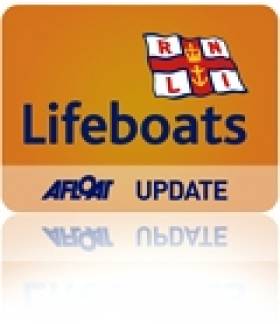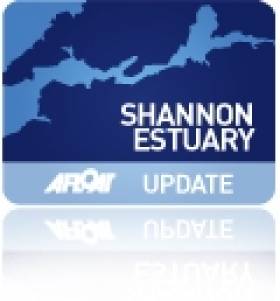Displaying items by tag: Kilrush
Racing Switches to Kilrush for October Series
Those participating are Golden Kopper, Kerry Dream, Dexterity, Tangalooma and Dis-a-ray. Unfortunately, for all the competitors the first two Sunday's in the month racing was cancelled due to weather conditions.
Racing took place yesterday with a 18 to 20 knots of south-south westerly breeze, however gusting up to 28 knots at times, which certainly proved challenging for all the competitors.
In Class 1 IRC, Dexterity from FYC took line honours and first place on corrected time, and in Class ! ECHO, Hero from RWYC sailed superbly to pip Dexterity on the line.
In the White Sails division, James McCormack on Alphara from FYC were the winners on corrected time..
The Mermaid October series continues every Sunday with first gun at 2pm.
Peader McGrath is organising a Power Boat level 2 course on Saturday, November 5 and Sunday, November 6. This course is specifically geared towards members, who wish to learn more on power boating, and it is great value. Members are asked to contact Peader on 087 2600817 immediately to secure a place.
The lift-out day for all craft at Cooleen Point is scheduled to take place on Saturday, November 5, starting at 10am.
The annual general meeting of the club is pencilled in for Friday, November 25 at 8pm, and the laying-up supper will take place on Saturday, November 26 at 8pm. Music will be provided by Different Souls, and tickets are priced at €20, which can be obtained from any committee member.
Well, as all members may be aware the West of Ireland Offshore Racing Championship's will be held in Cooleen Point from Wednesday, July 11 to Saturday, July 14, 2012, and quite a lot of preparation is already underway. It is anticipated that an entry of 50 yachts will be racing in their respective classes. The championship's are co-inciding with the club's golden jubilee celebrations.
Celtic Mist to Berth in Kilrush Creek Marina, Co Clare
Shannon Development is sponsoring the IWDG by providing a berth for Celtic Mist at Kilrush Creek Marina as the Company sees it as an important asset for West Clare. Shannon Development's Regional Development Manager for Clare Finbarr Brougham said: "We are delighted that IWDG secured Celtic Mist for Kilrush Creek Marina as it will provide a significant focal point of interest in the Marina and should attract a number of visitors to the yacht with the consequent knock on effect to the town of Kilrush. We would like to take the opportunity of wishing the Irish Whale and Dolphin Group every success in relation to the future use of Celtic Mist."
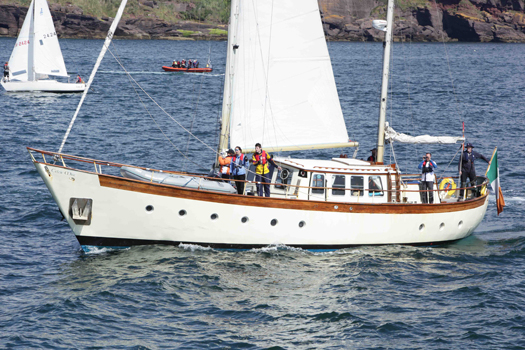
Celtic Mist is heading for Kilrush. Photo: Shay Fennelly
The yacht will be used for research and surveying for whales, dolphins and other marine wildlife in Ireland. It will also be used for training people to carry out marine surveys including the use of acoustic monitoring with towed hydrophones.
IWDG Co-ordinator Dr Simon Berrow said: "The marine wildlife around Ireland is superb, with whales, dolphins, seals, seabirds and basking sharks abundant at different locations and times of year. However we still know relatively little about what occurs where and why. Celtic Mist will provide a fantastic platform from which to survey Irish waters and help us learn more about this fantastic resource."
All are welcome to visit Celtic Mist when she arrives in Kilrush on Saturday 16 July. The expected time of arrival is between 1500h and 1600h but it is advisable to check www.iwdg.ie for confirmation.
As the cost of running a yacht like the Celtic Mist will be a major drain on scarce resources, the IWDG are looking for sponsors to help them fund its operation. Anyone interested can get further information by contacting IWDG at www.iwdg.ie
Drifting Yacht Starts Shannon Search And Rescue Operation
A Shannon Estuary search and rescue operation was mounted early yesterday (Wednesday) after a yacht was reported adrift and at risk of entering a busy shipping and ferry lane.
The alarm was raised shortly after 8.30am after a member of the public spotted the yacht drifting off Labasheeda village in south west Clare. The person reported that there appeared to be nobody on board the vessel. The Irish Coast Guard Marine Rescue Centre at Valentia in Co Kerry was contacted and staff there alerted the RNLI Lifeboat based at Kilrush. The Shannon based Coast Guard rescue helicopter was also scrambled. More HERE from Pat Flynn in the Clare Herald.
New Lifeboat for Shannon Estuary
Volunteers at Kilrush Royal National Lifeboat Institution (RNLI) station on the Shannon Estuary have received a new state-of-the-art lifeboat which enters service this month.
The Atlantic 85 RIB (Rigid Inflatable boat) is not only bigger and more powerful than Kilrush's existing craft but it also fitted with the latest Search and Rescue technology and instrumentation, equipping the service to continue saving lives into the next generation. Kilrush is one of only two stations in Ireland and the UK which will receive such an upgrade this year.
Following the construction of a new station in 1996, an Atlantic 21 B Class lifeboat was placed on temporary duty at the Kilrush station however it was replaced by a new Atlantic 75 lifeboat the following October. Fourteen years later, this vessel will now be replaced by the new Atlantic 85.
Kilrush Lifeboat Operations Manager John Lamb said, "This is a great vote of confidence in the crew here at Kilrush. It shows that we are doing what is being asked of us and that are being rewarded by being entrusted by this the latest in lifeboat technology and development"
The Atlantic class of lifeboats is named after Atlantic College, where the design was originally developed. Like previous RIBs, it has a manually operated self-righting mechanism, deploying an airbag mounted atop the A-frame arch. It is capable of being beached in an emergency without sustaining damage to engines or steering gear. The Atlantic 85 is fitted with radar and VHF direction finding equipment and can be operated safely in daylight in a force 6/7 and at night in a force 5/6 gale.
Related Safety posts
RNLI Lifeboats in Ireland
Safety News
Rescue News from RNLI Lifeboats in Ireland
Coast Guard News from Ireland
Water Safety News from Ireland
Marine Casualty Investigation Board News
Marine Warnings
The West of Ireland Offshore Racing Association (WIORA), 'West Coast Championships' concluded at the weekend, which was hosted by the Royal Western Yacht Club based in Kilrush Co. Clare.
Strong winds prevailed thought the event and unfortunately no sailing took place on Friday due to the extreme wind conditions, but international race officer Alan Crosbie and his team did an excellent job in getting six races completed for each of the four classes; On the last day, race management was conducted from the Navel Ship the LE Aoife making a visit to Kilrush and adding greatly to the spectacle afloat. Photos on the gallery here.
Numbers may have be back on previous years but what was lacking in numbers was made up for by the standard and competiveness of the racing in each of the classes, so much so that in Class 2 it went to the wire on the final race of the final day to decide the overall placing in the Class with the order they finished in deciding the order of the class overall's.
In these economic times without the huge support of partners, events like this Regional Event could not be staged and with alot of help from Kilrush Credit Union / Kilrush Creek Marina / Shannon Development / Dubarry Ireland / Kilrush Chamber of Commerce / ropelocker.ie / fotosail.com / afloat.ie and the many local business made sure this was a very successful event.
In IRC Class 1, Glen Cahill's J109 Joie de Vie from Galway Bay Sailing Club took the overall slot with Rob Allen's Corby 36 Mustang Sally from the host club finishing in second and Martin Breen's Harley 33 That's Life also from Galway Bay Sailing Club finishing a close third overall. In Echo Class 1, Rob Allen's Mustang Sally took the overall laurels with Team Foynes X332 from Foynes Yacht Club finishing second on equal points with Glen Cahill's J109 who finished third only been separated by count back on points.
In IRC Class 2, only three points separated the top three boats with Ray McGibney's Dehler 34 DISARAY sailing under the burgee of Foynes Yacht Club taking the final race and the overall in the class with Brian Rafferty's Corby 26 2602 from Sligo Yacht Club finishing only one and half points adrift securing second and Finbarr O Connell's Sigma 33 from Tralee Bay Sailing Club finishing a very close third. In Echo Class 2 it was even closer on points with only .75 of a point separating the top three with Liam Lynch's Sigma 33 from Tralee Bay Sailing Club taking the overall with Brian Rafferty's 2062 finishing second and Finbarr O Connells Treyona finishing third overall.
In IRC Class 3, Martin McNamara & Thomas Whelan's Chartered J24 Jaws/Chaos from the host club with four wins took the top slot with John Paul Buckley & Donal McCormack's Golden Shamrock Battle from Foynes Yacht Club finishing second and Gary Fort's chartered J24 Jaguar from Tralee Bay Sailing Club taking third overall. In Echo Class Three John Paul Buckley & Donal McCormack's Battle taking first with Gary Fort's Jaguar taking second and fellow club mate from Tralee Bay Sailing Club Mark Prendiville HB31 rooster taking third overall.
In Class Four (White Sails) all the way from Howth Yacht Club it was Stephen Mullaney's Beneteau 375 Walter Mitty taking the top slot with Richard Glynn's Oceanis 411 Velella from the host club taking second and John Finnegan's Oceanis 311 Jasmin II from Foynes Yacht Club taking third overall.
Best performing production boats –
X Yachts Cup – Team Foynes X332 Dexterity Foynes Yacht Club
Sigma 33 Cup – Finbarr O' Connell's Sigma 33 Tralee Bay Sailing Club
Beneteau Cup – Stephen Mullaney's Beneteau 375 Walter Mitty Howth Yacht Club
Full list of the West Coast Championship results please visit www.westernyachtclub.com
For WIORA the season is far from over with the continuation of the Murphy Marine Services West Coast Super League which is an extracted series of seven events on the West Coast, the next event is the O' Sullivan Marine 100 mile race from Fenit to Valentia Island on the 30th July followed by Clifden Regatta on the 06th – 08th of August with the Galway Bay Sailing Club Regatta on the 03rd – 05th September and Foynes Yacht Club Regatta on the 25th&26th of September.
For more information please vist the WIORA website www.wiora.org



























